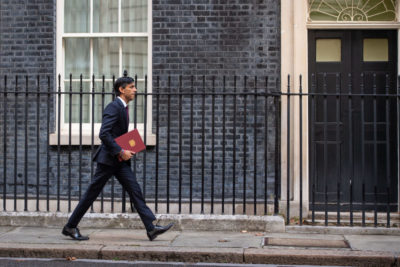Following his appointment as prime minister this morning, Rishi Sunak has pulled no punches as he addressed the nation outside Downing Street for the first time.
With the Conservative Party lagging some 30% behind Labour in the opinion polls, Mr Sunak’s comments were clearly designed to talk to voters, reiterating that he is neither Liz Truss nor Boris Johnson.
Mr Sunak was open in declaring that the Truss government had made ‘mistakes’, acknowledging, “I have been elected as leader of my party, and as your prime minister, in part to fix them. And that work begins immediately”.
Having already directed a broadside at his immediate predecessor, Mr Sunak’s remarks then contained remarks that no doubt had Boris Johnson in mind. Mr Sunak said, “This government will have integrity, professionalism, and accountability at every level. Trust is earned and I will earn yours”.


Nonetheless, despite Mr Sunak’s comments, Boris Johnson has since tweeted to suggest that, “this is the moment for every Conservative to give our new PM their full and wholehearted support”.
Seeking to place economic credibility at the heart of his government, Mr Sunak said “I will place economic stability and confidence at the heart of this government’s agenda. This will mean difficult decisions to come”.
Continuing he said, “The government that I lead will not leave the next generation, your children, and grandchildren with a debt to settle, that we were too weak to settle ourselves”.
In a rhetoric flamboyance at the end of his address, not something that has always been associated with Mr Sunak, the new prime minister said, “I understand too, that I have work to do, to restore trust after all that has happened. All l can say is that I am not daunted. I know the high office I have accepted, and I hope to live up to its demands”.
With opposition parties calling for Mr Sunak to call an immediate general election, Mr Sunak claimed, that the Conservative Party’s mandate was not the property of any one individual, arguing that this instead related to the party’s 2019 election manifesto.
In the last 46 years, some 7 of the previous 10 UK prime ministers have entered Downing Street on the back of an internal party leadership election or contest. Only 3, David Cameron, Tony Blair and Margaret Thatcher, have taken the reins of power following a public vote in a general election.
Speaking earlier as she departed Downing Street for the last time after just 49 days as prime minister, Liz Truss wished her successor every success, but nonetheless doubled down on her approach in office saying, “From my time as prime minister, I am more convinced than ever that we need to be bold and confront the challenges we face”.
Mr Sunak is now expected to turn his attention this afternoon to appointing his new Cabinet.
This new cabinet is thought likely to mark the end to the ministerial careers of a number of familiar figures, such as that of business secretary, Jacob Rees-Mogg and Welsh Secretary, Robert Buckland.
Instead, Mr Sunak is expected to appoint a number of his key supporters into cabinet roles. These include Dominic Raab, Oliver Dowden, and Mel Stride – all themselves former cabinet ministers. The trio have all been very visible on the airwaves championing Mr Sunak during both of the 2022 Conservative leadership elections.

